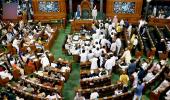The productivity of the Budget session was abysmal.
The Lok Sabha functioned for 33% of its scheduled time (46 hours); the Rajya Sabha 24% (32 hours).

The Monsoon session of Parliament will have 17 sittings until August 11.
But even a smooth run across sittings cannot prevent the current 17th Lok Sabha from earning the ignominy of being the shortest full-term since 1952.
Until the Budget session that concluded in April, the 17th Lok Sabha had functioned for 230 sitting days.
Of all the Lok Sabha sessions that completed the full five-year term, the 16th Lok Sabha had the lowest number of sitting days (331).
One more year and two more sessions remain in this Lok Sabha, with 58 average sitting days a year.
Among the proposed Bills for introduction, the most contentious would be the Government of NCT of Delhi (Amendment) Bill to replace the ordinance that gave the Centre powers over bureaucracy under the Delhi government, which it brought after an adverse May 11 Supreme Court order.
The Aam Aadmi Party, with 10 MPs in the Upper House, is set to protest the ordinance. At its parliamentary strategy meeting, the Congress decided it would oppose the Bill.
The BJP lacks a majority in the Rajya Sabha. It could get embarrassing for regional parties, especially those that have bailed the BJP out in the Upper House in four years, such as the Biju Janata Dal, to vote in favour of the Bill.
The government has listed 21 new Bills to introduce in the monsoon session.
It might also take up half a dozen pending Bills.
But the productivity of the Budget session was abysmal.
According to PRS Legislative Research, the Lok Sabha functioned for 33 per cent of its scheduled time (46 hours); the Rajya Sabha 24 per cent (32 hours).
The second part of the session was as low as 5 per cent for the Lok Sabha and 6 per cent for the Rajya Sabha.
The tentative legislative business to be taken up by Parliament during the session will include the following:
- The Government of National Capital Territory of Delhi (Amendment) Bill to replace the Centre's ordinance
- The Drugs, Medical Devices, and Cosmetics Bill to ensure the quality and efficacy of drugs and medical devices
- The Jan Vishwas (Amendment of Provisions) Bill to decriminalise minor offences by amending 183 provisions
- The Mines and Mineral (Development and Regulation) Amendment Bill for introducing exploration licences and delisting some minerals from the list of atomic minerals
- A Bill to establish a National Co-operative University
- The Digital Personal Data Protection Bill, 2023
- The Ancient Monuments and Archaeological Sites and Remains (Amendment) Bill aimed at rationalising prohibited area around monuments
- A Bill for setting up a National Dental Commission and repealing the Dentists Act, 1948
- A Bill to set up a National Nursing and Midwifery Commission and repeal the Indian Nursing Council Act, 1947
- The Registration of Births and Deaths (Amendment) Bill, 2023, to make the registration process people-friendly
- Three Bills related to OBCs, STs, and SCs in Jammu & Kashmir
- The Cinematograph (Amendment) Bill to check film piracy and introduce age-based categories of certification
- A Bill to establish a National Research Foundation and repeal the Science and Engineering Research Board Act, 2008
Some of the pending Bills likely to be taken up are:
- The Biological Diversity (Amendment) Bill, 2022
- The Multi-State Co-operative Societies (Amendment) Bill, 2022
- The DNA Technology (Use and Application) Regulation Bill, 2019
- The Forest (Conservation) Amendment Bill, 2023, for which a joint committee will submit its report
- The Mediation Bill, 2021
Feature Presentation: Aslam Hunani/Rediff.com












 © 2025
© 2025